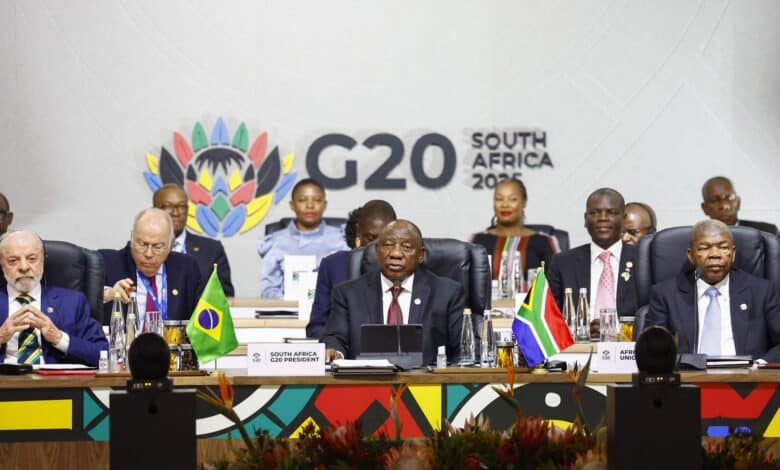News Flash
News Flash

JOHANNESBURG, Nov 22, 2025 (BSS/AFP) - A US-European rift over the future of
Ukraine threatened to overshadow a G20 summit that started in South Africa on
Saturday marked by the absence of Donald Trump.
The Johannesburg gathering was attended by a host of world leaders including
French President Emmanuel Macron, Indian Prime Minister Narendra Modi,
Chinese Premier Li Qiang, Brazilian President Luiz Inacio Lula da Silva and
Turkish President Recep Tayyip Erdogan.
But it was boycotted by the US president, with his government saying South
Africa's priorities -- which include boosting global cooperation on trade and
climate action -- run counter to US policy.
South African President Cyril Ramaphose, opening the event, implicitly
rebuffed Trump's absence by stressing that "multilateralism" was needed to
help solve global challenges, including from "escalating geopolitical
tensions".
The US president nonetheless loomed large at the first summit of the group of
major economies to be held in Africa after he produced a surprise unilateral
US plan to end the war in Ukraine largely in line with Russia's goals.
Leaders from Europe, Canada, Japan and Australia were to huddle on the
sidelines of the summit on Saturday to "discuss the way ahead on Ukraine", an
EU official said.
A European diplomatic source told AFP: "We are working on making the US plan
something more able to be applied, based on previous dialogue."
Macron, German Chancellor Friedrich Merz and UK Prime Minister Keir Starmer
on Friday, after a call with Ukrainian President Volodymyr Zelensky, stressed
that any such plan needed the "joint support and consensus of European
partners and NATO allies".
But Ukraine and its allies have only a few days to try to influence
Washington's 28-point proposal.
Trump has warned that "Thursday is, we think, an appropriate time" for
Ukraine to accept it.
- Climate impasse -
Another issue dogging the G20 summit was a deadlock at COP30 climate
negotiations taking place in Brazil.
Friday was meant to be the last day of those talks, which had gone on for
nearly two weeks. But they have spilled into overtime because petro-states
were accused of resisting any reference to a fossil fuel phaseout in the
final text.
Despite the headwinds, host South Africa stressed that international
cooperation was key.
"The G20 underscores the value of the relevance of multilateralism. It
recognises that the challenges that we face can only be resolved through
cooperation, collaboration and partnership," Ramaphosa said.
He said that a joint G20 summit leaders' declaration, adopted at the start of
the summit, "sends an important signal to the world that multilateralism can
and does deliver".
The US boycott echoes Trump's decision not to send an official delegation to
the COP30, and reflects a general American withdrawal from international
forums.
Washington has said it would send its charge d'affaires from its embassy at
the end of the Johannesburg meeting only for a handover ceremony, as the
United States will host next year's G20 summit at a golf club owned by Trump
in Florida.
The G20 is a grouping of 19 countries plus the European Union and the African
Union. It represents 85 percent of global GDP and around two-thirds of the
world's population.